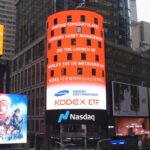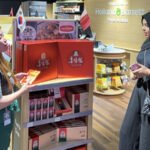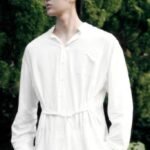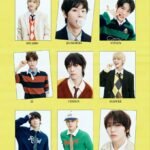A CU employee showcases a large model box of Dubai-style chocolate, which launched on July 6. The initial stock of 200,000 units sold out on the same day (Courtesy of CU)
Back in 2022, when the COVID-19 pandemic was rampant, South Korea’s convenience stores (CVs) saw their sales fly high as people dropped by small retail stores in their neighborhood to get snacks.
CVs posted a 10.8% sales increase in 2022 from the year prior while hypermarkets and supermarkets saw their sales decline 7.6% and 2.5%, respectively.
In 2023, CVs still eked out decent sales growth, although growing at a slower pace of 8% despite all the bad news, including a rapid rise in Chinese e-commerce malls such as AliExpress and Temu in Korea.
(Graphics by Dongbeom Yun)
CU and GS25, two leading Korean convenience stores, however, are witnessing their sales decline rapidly from the start of this year as rising consumer prices keep people from even visiting nearby retail stores.
According to retail industry officials on Friday, CU and GS25 likely posted a mere 1% on-year sales increase in the second quarter.
Given the price increase of major products sold at CVs such as ramen, snacks, ice cream and milk over the past year, we can say our sales dropped,” said a convenience store operator in Seoul.
Fix Dessert Chocolatier’s Dubai chocolate (Screenshot captured from the company’s Instagram)
‘EARNINGS SHOCK’ EXPECTED
Analysts expect many retail store operators to post “shocking” earnings declines in the second quarter.
According to the market consensus, BGF Retail Co. and GS Retail Co. likely posted 78 billion won () and 65 billion won in operating profit, respectively, in the April-June period – similar to their year-earlier profits.
Some analysts even expect them to swing to losses.
Reflecting their weak sales performance, the companies’ shares have already fallen.
Shares of BGF Retail broke below the 100,000 won line on July 5 – the first time to do so since 2017. Earlier on Friday, the stock was trading 0.7% lower at 106,300 won.
Dubai-style chocolate hit CV shelves on July 6
GS Retail was trading 1.4% down at a 10-year low of 21,250 won earlier in the day.
WEAK ECONOMY
Analysts attributed CVs’ weak sales and profit performance to the slowing domestic economy, coupled with elevated consumer prices.
According to the National Statistical Office, the retail sales index in the first five months of this year fell 2.3% from the year-earlier period – the fastest decline since the 3.1% fall in 2009.
The sizzling weather is also a reason behind the CVs’ sales decline.
Data from the Korea Meteorological Administration showed the country’s average temperature in June was 22.7 degrees Celsius, marking the hottest June since 2020. Seoul’s average highs were 30.1 degrees, keeping people staying at home rather than venturing out for outdoor activities.
Dippin’ Dots ice cream
DUBAI CHOCOLATE CRAZE, DIPPIN’ DOTS
To get out of the sales doldrums, convenience stores are quickly catching up with the food industry trend.
With the Dubai chocolate craze going viral on social media, particularly among young consumers in their 20s and 30s, CU began selling “Dubai Style Chocolates” on July 6, with GS25 and 7-Eleven also planning to launch their versions soon.
At CU stores, the initial batch of 200,000 Dubai chocolates was sold out on the launch day.
The convenience store products differ from the original in ingredients. Still, they are in short supply, according to CU.
The original Dubai chocolate bar is filled with pistachio filling and is made with milk chocolate and shredded pastry dough known as kataifi.
For its part, 7-Eleven opened a shop-in-shop store to sell beaded ice cream in partnership with Dippin’ Dots.
By Jae-Kwang Ahn
ahnjk@hankyung.com
In-Soo Nam edited this article.













